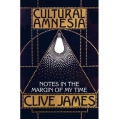Cultural Amnesia. Notes in the Margins of My Time

Ed. Picador
Date de publication : 01/04/2008
Following some explicit hints to my daughter, I was delighted to receive this as a Father's Day gift. I consider myself a fairly well-read person, but only in the extremely limited sense of having read just about everything Clive James has ever written, ranging from his TV reviews, literary criticism, autobiography, novels and verse to his lyrics for singer-songwriter Pete Atkin. More broadly, what I've read in his books has introduced me to other writers, and it's always been entertaining to see his opinion (particularly when it's not high) on books which I've already read.
There's more of the same in this book, but its scale and structure dwarfs anything he's produced up until now. Some four years in the writing, it's been viewed as the culmination of his life's work (although he's rumoured to have already started work on a second volume). At first glance, it's a collection of more than a hundred critical essays on selected cultural or historical figures, mostly from 20th century Europe. Digging deeper reveals other things, as he uses his ideas about the person as a jumping-off point for musings on other topics such as plagarism, fame, memory, reading, grammar and bibliophilia.
His range of reference is extraordinary, taking in books written in German, French, Italian and Spanish (all of which he apparently reads fluently). There's a strong didactic element running through this work, as he breaks off to give advice on the most profitable way to learn languages, the best dictionaries and translations, and which books are most easily used as a starting point for breaking into a specific language. He also tells stories of the tracking down of books in shops all over the world that are explicit - even loving - in their physical detail as he describes their bindings, typeface and paper, and how they look on his shelves at home.
His main theme here, however, is culture and the struggles of liberal humanism against totalitarianism. This is clearly a big subject, and each one of these essays illuminates it from a slightly different angle until you're left feeling wiser, older and sadder at the heroism and destruction that inspired this work. Along the way, his lively and playful turns of phrase are enough to make you start making notes in the margin yourself - to take just one example at random, on p498 he describes the constant need to refresh our memory of good things that we've read as 'a polishing of the pipe, like El Dorado's throat'. I'm sure I won't read a better book this year, and perhaps for some time to come afterwards as well.
